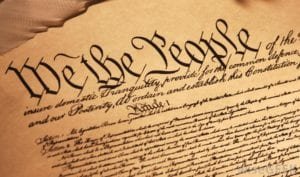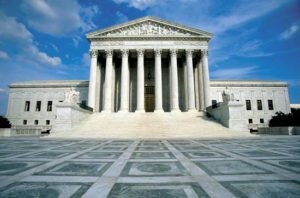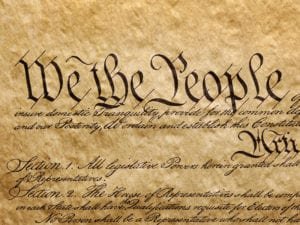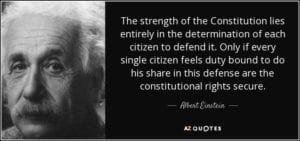Understanding Constitutionality On Constitution Day
 There clearly is some misunderstanding about what is deemed constitutional and what is not. Even if one has the most stringent, literal interpretation of the governmental powers and rights enumerated in our founding legal document, the Constitution, there are a lot of changes that have been made to the literal meaning of the document over the past 227 years.
There clearly is some misunderstanding about what is deemed constitutional and what is not. Even if one has the most stringent, literal interpretation of the governmental powers and rights enumerated in our founding legal document, the Constitution, there are a lot of changes that have been made to the literal meaning of the document over the past 227 years.
Those changes are not just in the form of Amendments, of which we have 27. They also come in the form of legislative statute and Supreme Court precedent, which have largely redefined the relationship of the average citizen to the federal government, and severely restricted individual liberty. The result is that very little that is in the Constitution is literally applied today, much to the consternation of those of us who believe in freedom and limited governmental power over the individual.
 Nearly every concept and precept embedded in the Constitution has been altered or redefined since the document was adopted in 1789. Every legislative statute and judicial ruling, refines, redefines or reinterprets aspects of our foundational legal document. If an Act of congress passes and is signed into law, it builds upon the body of law interpreting the powers granted to them by our most cherished political parchment. If such an Act is challenged through the judicial system, and is either validated or invalidated by judicial ruling, the highest jurisdictional ruling on the Act stands, thereby defining anew some aspect of our relationship with the Constitution.
Nearly every concept and precept embedded in the Constitution has been altered or redefined since the document was adopted in 1789. Every legislative statute and judicial ruling, refines, redefines or reinterprets aspects of our foundational legal document. If an Act of congress passes and is signed into law, it builds upon the body of law interpreting the powers granted to them by our most cherished political parchment. If such an Act is challenged through the judicial system, and is either validated or invalidated by judicial ruling, the highest jurisdictional ruling on the Act stands, thereby defining anew some aspect of our relationship with the Constitution.
Examples of this are plentiful, but just a few samples will illustrate. Nowhere in the Constitution do we read that failure to be warned against making self-incriminating statements is a violation of our constitutional rights, yet Miranda v Arizona (1966) requires the Miranda Warning be issued. And nowhere in the Constitution is found the right of government to mandate purchase of a product or a service, yet NFIB v Sibelius (2012) upheld the government’s requirement, as mandated in the Affordable Care Act, to purchase health insurance. And even though the 2nd Amendment to the Constitution states, “the right of the people to keep and bear Arms, shall not be infringed,” there are at least 271 federal, and perhaps as many as 20,000 state and local gun-control laws on the books that directly infringe on that declared right.
 Statute and judicial precedence redefine constitutionality, whether we like it or not. But that verity does not obviate the need to be well versed on what the founders envisioned for this land of liberty, as codified in our Constitution. If we are to preserve our land of liberty, a return to our founding principles is requisite. That’s why September 17th was declared Constitution Day, and September 17-23 of each year was designated Constitution Week, by joint Congressional Resolution, and the signature of then President Dwight D. Eisenhower in 1953. September 17, 1787 marks the historic signing of the Constitution of the United States of America, which was then ratified and put into effect two years later.
Statute and judicial precedence redefine constitutionality, whether we like it or not. But that verity does not obviate the need to be well versed on what the founders envisioned for this land of liberty, as codified in our Constitution. If we are to preserve our land of liberty, a return to our founding principles is requisite. That’s why September 17th was declared Constitution Day, and September 17-23 of each year was designated Constitution Week, by joint Congressional Resolution, and the signature of then President Dwight D. Eisenhower in 1953. September 17, 1787 marks the historic signing of the Constitution of the United States of America, which was then ratified and put into effect two years later.
The Constitution is prefaced with three important words, “We The People,” acknowledging, for the first time in human history, formation of a nation and a government that derived its power from the consent of the people. And as its citizens, and the collective holders of the power from which our government claims its authority, we must needs be informed, educated, and knowledgeable of our role in governance, and the document which assures us, at least ostensibly, of our inalienable rights.
 Thomas Jefferson acknowledged this, when he said, “I know no safe depository of the ultimate powers of the society but the people themselves; and if we think them not enlightened enough to exercise their control with a wholesome discretion, the remedy is not to take it from them but to inform their discretion by education. This is the true corrective of abuses of Constitutional power.”
Thomas Jefferson acknowledged this, when he said, “I know no safe depository of the ultimate powers of the society but the people themselves; and if we think them not enlightened enough to exercise their control with a wholesome discretion, the remedy is not to take it from them but to inform their discretion by education. This is the true corrective of abuses of Constitutional power.”
Over the course of the past several years, the abuses of Constitutional power by our government have increased exponentially. There has never been a time in our history when remedial education of citizenship and the Constitution have been more essential.
That is precisely the objective of Constitution week, to 1) emphasize our responsibility of protecting and defending the Constitution to preserve it, and our freedoms, for posterity; 2) to understand the unique and binding nature of the Constitution in our heritage as Americans; and 3) to study and more fully comprehend the historical events surrounding the founding of our country.
Those who serve as our elected representatives, as well as those who don the nation’s uniform, take an oath of fealty to the Constitution, and vow that they will support and defend it against all foes, foreign and domestic. I often reflect how all of us, as citizens, should take a similar oath. For if we did, the abuses of power, usurped and purloined from the citizens, would be so much less likely to occur as we observe on a nearly daily basis in news emanating from our seats of government.
 Albert Einstein, an immigrant to America, recognized the need for all citizens to be informed, educated, and resolute in preserving our rights, which include limitation of the powers of the state. Said he, “The strength of the Constitution lies entirely in the determination of each citizen to defend it. Only if every single citizen feels duty bound to do his share in this defense are the constitutional rights secure.” With so many of our fellow citizens more concerned about getting their share of government largesse at the expense of their taxpaying neighbors, the determination to defend and support the Constitution and our liberties is commensurately diminished.
Albert Einstein, an immigrant to America, recognized the need for all citizens to be informed, educated, and resolute in preserving our rights, which include limitation of the powers of the state. Said he, “The strength of the Constitution lies entirely in the determination of each citizen to defend it. Only if every single citizen feels duty bound to do his share in this defense are the constitutional rights secure.” With so many of our fellow citizens more concerned about getting their share of government largesse at the expense of their taxpaying neighbors, the determination to defend and support the Constitution and our liberties is commensurately diminished.
It’s difficult for us as a citizenry, to stand collectively and individually against those who seek to subvert our liberties if we suffer from abject ignorance of what those rights are, and what our government was constructed to do, and not to do. It is readily apparent from blogs and social media that great numbers of our fellow citizens suffer from acute ignorance of our founding documents, as they opine based on ideological assumptions rather than what the Constitution authorizes or allows.
Consequently, the primary objective of Constitution Day is to increase our understanding and knowledge of our founding documents and the rights and privileges assured thereby. Ignorance, apathy, and selfishness are pitiful excuses for citizens in a constitutional republic that was founded upon principles of individual liberty and limited governmental power!
It’s incumbent upon each of us as citizens to avail ourselves the opportunity to become more informed, more educated, and more proactive citizens by reading our Constitution and studying the history surrounding its ratification. I’m convinced most of those who are critical of our Constitution will be amazed at what is in it, but perhaps even more, by what is not.
Associated Press award winning columnist Richard Larsen is President of Larsen Financial, a brokerage and financial planning firm in Pocatello, Idaho and is a graduate of Idaho State University with degrees in Political Science and History and coursework completed toward a Master’s in Public Administration. He can be reached at rlarsenen@cableone.net.




Building on or refining our Constitution isn’t where I see ‘THE problem’. If at will ‘re’ interpretations are acceptable doesn’t that obscure the intent? This is a point of contention frequently raised about our Supreme Court now.
In 2004, Public Law 108-447, section 111 was passed and requires “any educational institution receiving Federal funds to hold an educational program on the United States Constitution on Sept 17 of that year for all students…..each Federal agency or department shall provide educational and training material concerning the US Constitution to each employEE on Sept 17.
This is a congressional mandate intended to educate students on the Constitution and to celebrate it’s writing. I am yet to find a single student that has had a day of instruction in Sept. I have contacted our local school district and adjacent ones and NOT A SINGLE administrator even knew this.!!! I had the same results in 2 other states…..
Astute and insightful comments, as always, Jan! thank you! That’s disturbing that constitutional instruction is not being carried out, per the statute, but it doesn’t surprise me.
Regarding our “problem” with the Supreme Court, I have a few thoughts on that. It is clear from reading Article III, Section 2 of the Constitution that the founders delineated with specificity, what cases the Supreme Court had jurisdiction over. It declares, “The judicial power shall extend to all cases, in law and equity, arising under this Constitution, the laws of the United States, and treaties made, or which shall be made, under their authority…” In other words, the jurisdiction of the federal courts is limited to what we typically associate with federal matters. They do not have unlimited jurisdiction over the decisions handed down by state courts.
Even more telling, however, is the final sentence of Article III, Section 2, which states, “…with such exceptions, and under such regulations as the Congress shall make.” Congress, therefore, has the constitutional authority to limit or regulate the kinds of cases the Supreme Court hears.
Jefferson clearly understood the system of checks and balances on the respective powers of the three branches of government. As he said in a letter to Abigail Adams in 1804, “The Constitution… meant that its coordinate branches should be checks on each other. But the opinion which gives to the judges the right to decide what laws are constitutional and what not, not only for themselves in their own sphere of action but for the Legislature and Executive also in their spheres, would make the Judiciary a despotic branch.” It has obviously become a despotic branch since it can overturn the will of the people as expressed even in referenda or initiatives.
We need to reclaim the power promised in the 10th Amendment of the Constitution. We have control over the legislative and executive branches through the power of the vote. By exercising the power of the vote we can also regain control of the oligarchical judiciary by having Congress limit, as intended by the Constitution, the appellate function as currently abused by the federal judiciary. They could be limited to federal statute only, specifically exclude state issues, or limited in any way they choose.
Congress clearly has the power to limit the power and scope of the federal appellate process. Since Congress is doing nothing to limit judicial review, perhaps it’s time for us to remind them they have the power to do so.
Absolutely! Education is key. It’s what’s needed at the state representative level to initiate the amendment process, and it’s a sorely-needed if unintended by-product for the general public should a Convention of States actually occur.
I’m sick and tired of secret back room deals. I’m done with waiting until something is passed to find out what’s in it. I wanna watch this convention every day on C-SPAN, with phone in hand where I’ve got both state reps and my senator on speed dial.
The greatest need for making this convention an exemplar of the free and open exchange of conservative / constitutional principles in the marketplace of ideas is that the public should not be deprived of a debate that will touch on a vast spectrum of issues that many have never heard of or even contemplated, issues that lie at the very foundation of the Republic.
Even if, God forbid, the convention were to fail and not produce a single agreed-upon proposal, it is my opinion that the opportunity to educate literally three generations of living Americans is worth whatever cost there will be to pay in a predictably hostile press.
Every legislator, the President and Supreme Court justices take the same oath to “support and defend the Constitution” and “bear true faith and allegiance to the same”. If the citizenry understood this oath and the Constitution, I would hope most of the current crop of incumbents would not be re elected. Sadly, that is not the case today because of a citizenry more informed of sports statistics, allegiance to sports teams, waiting for the next Dancing with the Stars celebrities or glued to their smart phones. It’s a complex society we live in, trying to balance everyday living of earning a living, raising a family and trying to deal with the stress of it all. The saving grace to turn out informed citizens was our educational system. I say was because today’s public schools appear to be more interested in political correctness and their left leaning agenda. Parents, although I think many try hard, just do not have enough time in the day to properly educate their children to become enlightened members of society.
Recognizing how out of control our Federal Govt. has become, The Convention of States Project began a process of convening a convention of states under the authority of Article 5 of the Constitution. The purpose was to introduce amendments to the Constitution that would rein in the scope and power of the Govt., redefine the public welfare and commerce clauses, limit spending and taxes, curtail unconstitutional executive orders, rein in regulations by unelected bureaucrats that have the force of legislation, term limit legislators and judges and give the States final say on Supreme Court decisions. Thirty-four States are required to convene the Convention and 38 are required to ratify any of the amendments. So far eight States have signed on and many more have proposals in their legislatures. This can happen faster than hoping for a more informed citizenry. Learn more at conventionofstaes.com and sign the petition.
Robert, I completely concur with your sentiments! Thank you for your insights.
I fully embrace and support the Article V Convention of the States amendment process, as evidenced by a column two years ago on that very subject. https://www.conservativedailynews.com/2014/09/article-v-convention-congress-will-not-act-so-we-will/
I’m concerned about the power of the Supreme Court to redefine the law and its tendency essentially make up laws out of whole cloth. I’m supportive of the idea of a Convention of States including the possibility to amend the Constitution to impose term limits on the Supreme Court. However, I don’t suppose that will completely solve the problem – it will just move the judiciary a small step toward the people.
I’ve heard the idea floated of a amendment to constrain the interpretation of the law to what was intended by the legislators. I don’t know if that’s a viable idea or not.
well-written article. I think it a good idea that all US citizens be required to take oath to uphold the constitution. We need to get back to the original intent of our constitution. I believe it is the single most important reason for the rise of the US and that failure to adhere to the original intent of the document will be our downfall. Unfortunately, Washington politicians seem to not be concerned and appear to only be interested in keeping and furthering the power they have acquired by usurping the constitution. for a solution as big as the problem visit http://www.comventionofstates.com become informed and involved in this rapidly growing grassroots movement to reclaim our constitutional republic